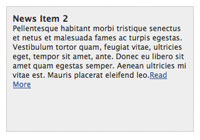Object.keys
I adore JavaScript objects. Love them. You're probably asking "well, why don't you marry them?" Trust me: if I could, I would. Arrays are nice and all but object keys provide another level of structure and information that is invaluable. For example, it's much faster search an object for a key than it is to search an array for value presence.
The way we've always iterated on an Object instance was always a for loops with a hasOwnProperty check which was ugly; Object.keys (not Object.prototype.keys) provides an array of Object properties!
var person = {
firstName: 'David',
lastName: 'Walsh',
// ...
};
Object.keys(person).forEach(function(trait) {
console.log('Person ', trait,': ', person[trait]);
});
If you work with JSON or simply raw JavaScript objects, and you haven't been using Object.keys, now is the time to ditch the old method for this elegant solution!
![Interview with a Pornhub Web Developer]()
Regardless of your stance on pornography, it would be impossible to deny the massive impact the adult website industry has had on pushing the web forward. From pushing the browser's video limits to pushing ads through WebSocket so ad blockers don't detect them, you have...
![5 More HTML5 APIs You Didn’t Know Existed]()
The HTML5 revolution has provided us some awesome JavaScript and HTML APIs. Some are APIs we knew we've needed for years, others are cutting edge mobile and desktop helpers. Regardless of API strength or purpose, anything to help us better do our job is a...
![Using Dotter for Form Submissions]()
One of the plugins I'm most proud of is Dotter. Dotter allows you to create the typical "Loading..." text without using animated images. I'm often asked what a sample usage of Dotter would be; form submission create the perfect situation. The following...
![Create a Simple News Scroller Using Dojo]()
My journey into Dojo JavaScript has been exciting and I'm continuing to learn more as I port MooTools scripts to Dojo. My latest experiment is porting a simple new scroller from MooTools to Dojo. The code is very similar!
The HTML
The news items...





Why don’t you use this:
for (let trait in person){console.log(trait)}@Franz,
for..in iterating over NON own properties.
Not very well supported http://caniuse.com/#feat=let
Obligatory https://babeljs.io/
Also would iterate over prototype properties.
The
for each...instatement is deprecated as the part of ECMA-357 (E4X) standard. E4X support has been removed, butfor each...inwill not be disabled and removed because of backward compatibility considerations. Consider usingfor...ofinstead. (Please refer to bug 791343.)Also: Use
const, not let. The loop creates a new context in each iteration, the loop variable therefore is constant unless your loop-code changes it.